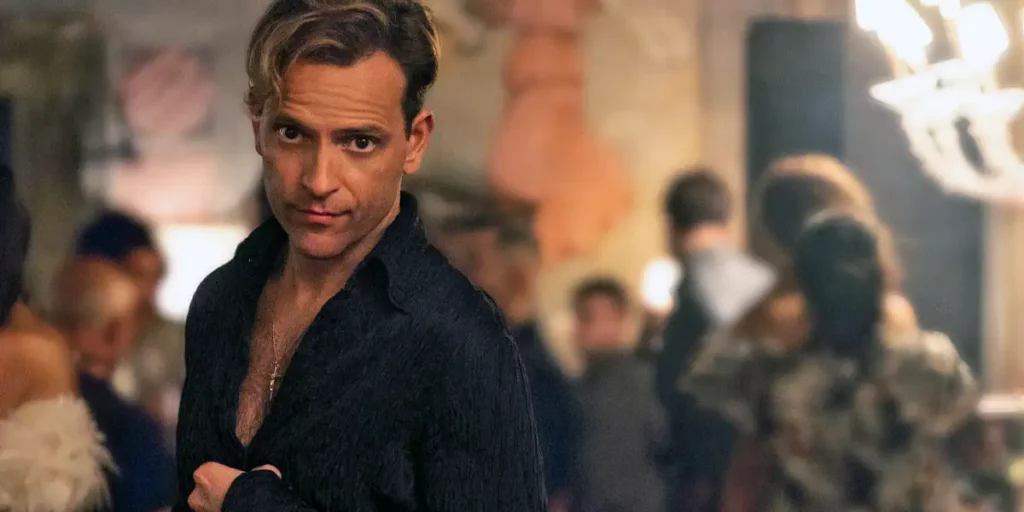Netflix’s Rocco Siffredi series Supersex is only loosely inspired by the porn star’s life, but you’ll enjoy its campy elements and themes of masculinity if you’re not expecting a biopic.
Creator: Francesca Manieri
Genre: Drama (Series)
Episodes: 7
Global Release: March 6, 2024
Where to watch: Netflix
“Don’t f*ck it up,” someone tells Rocco Siffredi (Alessandro Borghi, of Mondocane) at the beginning of SuperSex, right before he takes the stage for a press conference in Paris in 2004. And though it’s a sentence we’ll hear several times throughout the series, what’s clear from the start is that, despite his fame and the unusual desires that drive him, Rocco might actually be the sanest person around.
Soon, the Netflix show takes us back to when Rocco was a child – then known as Rocco Tano and not porn star/global phenomenon Rocco Siffredi – and, right off the bat, we realize two things about the show. The first is that SuperSex won’t be a biopic, but rather a fictional story that only takes inspiration from the Italian actor and director’s life and career. The second is that a much more interesting story hides beneath the series’ premise – one that has to do more with family ties, internalized homophobia and toxic masculinity than the porn industry itself.
The approach taken by writer-creator Francesca Manieri, producer Lorenzo Mieli and directors Matteo Rovere, Francesco Carrozzini and Francesca Mazzoleni is incredibly interesting, as SuperSex begins as a superhero tale. If Batman, Superman, Spider-Man, and all our favorite comic book heroes each had their own origin story, that’s how it begins for Rocco too, as a young child. In his case, we’re in a small Italian town named Ortona, with a pornographic magazine – the titular “SuperSex” – that shows up in his life when he needs it the most, helping him decipher and untangle feelings he doesn’t yet understand.
With great powers comes great responsibility, and, for Rocco, this means coming to terms with the fact that his well-meaning but old fashioned mum Carmela (Tania Garribba) will never look at him the same way as he looks at his younger brother Claudio, whose health has been fragile ever since he was beaten up by a gang when he was 5 years old. Rocco has many brothers, but his older half-brother Tommaso is the only one who really pays attention to him; needless to say, Rocco worships him. But Tommaso is also not the healthiest person to be around, as not only is he a violent, manipulative person who’s often involved in criminal activities, but he also has very misogynistic views on sex and women that get passed on to Rocco from a very young age.

In fact, a lot of people seem to dislike Tommaso, starting from Rocco’s own family, who never fails to remind him that he’s not a “Tano” but a “Del Signore,” and he doesn’t fully belong there. But to Rocco, “Tommaso was God. And God is nobody’s child”. And when our young superhero-to-be grows up, he moves to Paris with him and his girlfriend Lucia (Jasmine Trinca), and a new chapter of his life begins.
The rest, as they say, is history – except that this Netflix series is only loosely inspired by Siffredi’s own life. Which is partly what makes it so uniquely compelling, but also partly its downfall – at least, judging by the first three episodes that were screened at the Berlin Film Festival. On one hand, not having to recount things exactly as they went down gives the team behind the show a lot of creative freedom, and Supersex is wonderfully campy and self-aware. Alessandro Borghi is in his comfort zone and truly seems to have fun embodying this fictional version of Siffredi, whom we can’t help but adore from the moment we first hear him laugh. Supersex‘s most absurd, exaggerated moments are so well timed and well choreographed – not to mention ironic in the best possible way – that you won’t be able to take your eyes off the screen, and they’re also surprisingly restrained, for a film about a porn star.
At the same time, due to the campiness of these lighter moments, the series doesn’t really manage to make all of its characters well-rounded enough to successfully tackle the more serious themes it tries to approach, such as internalized homophobia. It’s clear from the start that Rocco harbors feelings for Tommaso, but the latter – especially as a grown-up, when played by Adriano Giannini – often comes across as the typical “Italian gangster stereotype”, and that’s where the series verges on melodrama. There are only so many outbursts of violence and sexist slurs that one can take in three episodes, and Tommaso’s characterization is so thin that, even though he’s such a major figure in Rocco’s life, he’s without a doubt the least interesting character in the show.
Tommaso’s girlfriend Lucia, who isn’t based on a real person but was created as a blend of various women with whom Rocco had a relationship in his life, is a more compelling character. But that is due more to the chemistry between Jasmine Trinca and Alessandro Borghi than to the clichéd “man forces woman to sell her body and treats her like a wh*re, but woman endures it all because of love” character arc she unfortunately gets.
Luckily, Rocco himself is a fully fledged character, and though many of his views are tainted by Tommaso’s teachings and his ties to his mother, it’s a pleasure to watch him grow into a person of his own. It’s through his character that Supersex manages to explore the theme of masculinity, especially when it comes to the idea that one is only a “man” if he adheres to a certain set of misogynistic rules and asserts his control over women at all times, often in violent ways. There’s a beautiful scene in episode 2, where Rocco starts going to a club where he can finally be sexually unhinged in the way he wants to, which also includes giving up control. Taking one of his half-brother’s most sexist remarks, he turns it into his own, non-toxic truth, realizing that, at the club, “there was no difference between f*cking and being f*cked” – and as corny as it sounds when taken out of context, it’s actually quite moving in the show.
Having only seen three episodes out of seven, this puts me in quite the dilemma, as it all depends on where the series will go from here. Even though some of its most promising themes are only barely approached, I still enjoyed watching Supersex: its gorgeous cinematography (Daria D’Antonio), perfect score (Ralf Hildenbeutel), and a truly superb Alessandro Borghi performance still make it an effortless watch, particularly when the series is at its most ironic and playful. If you aren’t expecting a biopic and are ready to overlook its most clichéd characters and scenes, you are guaranteed to have a lot of fun with the first three episodes of Supersex. Here’s hoping the series continues to deliver until the finale!
Supersex had its world premiere at the 2024 Berlin Film Festival and is now available to stream on Netflix.

